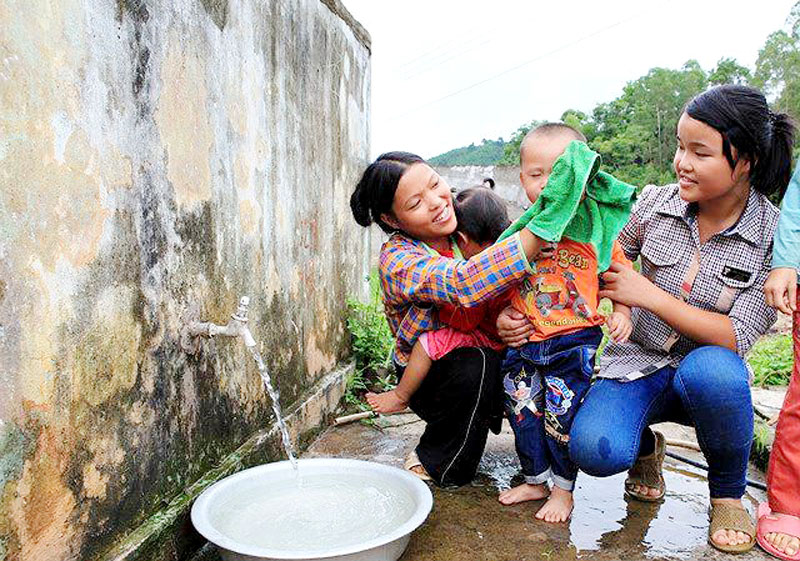
(HBO) - The resolution released at the 15th Hoa Binh Party Congress for the 2015-2020 tenure sets a target of 95 percent of rural locals accessing clean water by 2020. To this end, over the years, the province has focused on implementing many programmes and projects to mobilise resources for rural water supply and environmental sanitation.
Over the years, thanks
to support of the State, locals in Giap Dat commune of Da Bac district have
enjoyed clean water.
One of the key programmes in the field that has been sped up
is an outcome-based project on expanding the coverage of rural sanitation and
clean water for the 2016-2020 period, using loans from the World Bank.
The National Target Programme on New-Style Rural Area has
defined the focus of investment in realising the target of raising the ratio of
rural people accessing clean water in communes covered by the programme.
After years of overcoming difficulties, the national target
programme on clean water and rural environmental sanitation has gained
considerable achievements. The ratio of rural people accessing clean water
reached 91.5 percent, while 85.6 percent of poor households enjoyed clean
water.
The rate of schools having clean water and hygienic toilets is
80.9 percent, while the rate of communal health care station with clean water
and hygienic toilets is 90.1 percent.
The resolution of the 15th provincial Party Congress sets
that by 2020, 95 percent of rural people enjoy clean water, 75 percent of rural
households have hygienic toilets, 100 percent of schools and health care
stations have hygienic toilets and clean water works, and the majority of regional
health care stations are equipped with hygienic toilets, water supply work and
hand cleansing equipment.
Compared to the goals, the province has nearly completed the
target of the ratio of rural people accessing clean water.
According to the provincial Party Committee, at the end of
2018, six targets set in the resolutions were completed and exceeded, while
among the remaining nine targets, the goal of the ratio of rural people
accessing clean water was nearly finished. This is a good condition for the
province to complete and surpass the target in the future, thus improving the
public health and people’s living conditions, contributing to the sustainable
socio-economic development in the locality./.
Hoa Binh province is undergoing a dynamic transformation amid Vietnam’s national digital transition. Building on Poliburo’s Resolution No. 57-NQ/TW on breakthroughs in science, technology, innovation, and national digital transformation, the province has rolled out a wide range of practical action plans. A standout initiative is the "Digital Literacy for All” movement, an effort to ensure that no one is left behind in the digital era.
Hoa Binh province is undergoing a dynamic transformation in the wake of the national digital transformation movement. Building on Resolution No. 57-NQ/TW of the Politburo on breakthroughs in science, technology, innovation, and national digital transformation, the province has implemented a wide range of practical action plans. A standout initiative is the "Digital Literacy for All” movement ambitious effort to ensure that no one is left behind in the digital age.
With a spirit of unity and proactive problem-solving, the Party Committee, the government and the people of Dong Lai Commune (Tan Lac District) have made great strides in implementing the resolutions of the 24th Party Congress of the commune for the 2020 - 2025 term. Focusing on leadership and practical actions, the commune has brought the Party’s resolutions into daily life, creating strong impacts and pushing the local development forward.
Amid the nationwide push for digital transformation, young people in Hoa Binh Province are stepping up as dynamic pioneers, applying technology to enhance Youth Union operations and expand the reach of youth-led initiatives. Through creativity and adaptability, Youth Union organizations at all levels have introduced a series of practical solutions, contributing to modern governance and community development.
In recent years, An Nghia commune, located in Lac Son district, has stepped up administrative reform, focusing on improving the quality and efficiency of its single-window service unit for receiving and processing administrative procedures. These improvements have helped create favourable conditions for local residents and organisations to handle administrative procedures, contributing to the commune’s broader socio-economic development.
The Prime Minister-approved master plan to develop the multi-use value of forests ecosystems through 2030, with a vision to 2050, aims to improve the management and sustainable use of forest resources, create jobs, increase incomes, and improve the living standards of ethnic minorities, people in mountainous and remote areas, forest workers and those living near forests.



